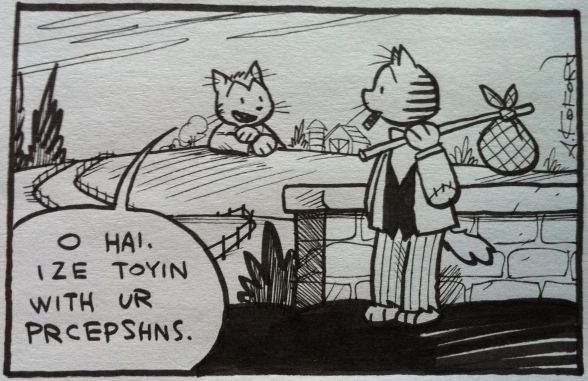In Defense of Food: An Eater’s Manifesto, Pollan. Non-fiction. This is an expansion of Pollan’s essay “Unhappy Meals” (which I talked about some time ago), in which he gives some reasoning that I find rather compelling for why we’re in the diet/health mess that we (the western world in general, but especially Americans) are in, and some suggestions for getting out of it. The latter are summarized (as in his earlier essay) as “Eat Food. Not too much. Mostly plants.”
One of the cultural features that Pollan rails against (no, that’s not fair—if I had written it, I would have railed; even “inveigh” is overstating it; Pollan merely describes, but it’s more effective for me than railing would have been) is “nutritionism”, a term coined by Gyorgy Scrinis to describe the ideology that follows from the assumption that “the key to understanding food is indeed the nutrients. Put another way: Foods are essentially the sum of their nutrient parts.” Now, as rather a reductionist myself, I don’t have a problem with that assumption, but as Pollan lays out the challenges involved with creating a diet (indeed, an eating culture) based on that assumption, it reminds me very much of trying to build a strong artificial intelligence from the reductionist view that all that goes on in a brain is the transmission of impulses through a set of junctions. In both cases, the reductionist practitioners have a long way to go before they can build a working model.
In the case of nutritionism, the consequences have apparently been proving fatal. At best it’s been trial and error: lots of babies born with neural tube problems? Oh, sorry, turns out some of the stuff we’ve been refining out of your wheat to make that soft, fluffy, white bread you love so much was important. We’ll just throw some of that back in. There, now. All better. Until we find the next vital nutrient that we didn’t know existed, or thought didn’t matter, or thought was bad. And there is increasing evidence that the interplay of nutrients is important. My reductionist self wants to believe we’ll get there, but I’m not at all convinced it’ll happen in my lifetime (especially if I continue the American culture of eating).
Fortunately, there are things we can eat—with which our species evolved, even—that have historically shown they give our bodies what they need, in roughly the right proportions. Pollan calls them “food”. Probably best to combine them in a diet similar to what some set of humans ate before industrialization arrived (odds are good that virtually any “traditional diet” will work). Most of what is sold in supermarkets (especially in the brightly lit central aisles) he refers to as “edible food-like substances”; products that in many cases started as food, but that have been processed to be sweeter and fattier, and travel better, and be cheaper to produce. Even what should be food in the produce aisles can be suspect, as industrial farming techniques coerce plants out of soil that was stripped of natural vitality some generations ago, and the plants themselves have been bred to be sweeter, travel better, and be cheaper to produce.
As much as it pains me to say it, there’s a good chance organic products are much better for you than their industrial counterparts, though it’s likely more to do with the absence of chemicals (plants develop more antioxidants when they have to fight off pests, and they get more from the soil when they take a little longer to grow—and when the soil has more to give than the industrial combo of NPK (Nitrogen, Phosphorus, and Potassium: the minimum the reductionists have been able to dump into the soil and get it to produce plants)) than certification or smugness, and many organic products at your supermarket may have traveled farther than non-certified produce. The best bet all around may be to avoid the supermarket altogether: patronize a farmers’ market, or join a CSA (community-supported agriculture); talk to the people who produce your food about how they deal with pests; shorten your food chain.
Much of Pollan’s advice seems expensive: one of his recommendations equates to “be more affluent”, and another is “pay more, eat less”. This follows rather logically from the perception that much of the mess we’re in is a result of the mid-1970s pressure for farmers to grow all the crops they possibly can, so the nation can eat plentifully and cheaply. Eating more sensibly—that is, eating food—will of course therefore be more expensive. But there’s loads of evidence that suggests doing so is a relatively easy way to undo the damage that eating the American way is doing to our bodies. I found it a much more compelling argument than anything in Fast Food Nation.
ForcedPerspective
Forcing our perspectives since 2002
